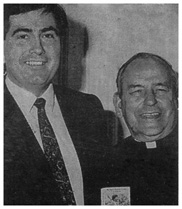 |
 | ||||||
 | ||||||
| || HOME >> PLACES >> CROSSMAGLEN | ||||||
 | ||||||
 | ||||||
| Crossmaglen Is Now At Centre Of The Sporting Universe | |||
The popular prelate, who was President of Crossmaglen Rangers GFC, played an important role in securing the end of British military occupation of portion of the club�s grounds and the social centre, which were taken over in 1971.
And what a unique situation, as St Oliver Plunkett Park plays host to the top clubs and counties in Ireland, with the Irish Tricolour flying, and thousands join in singing �The Soldiers Song,� in the shadow of a massive military installation. One of the oldest clubs in the county, Rangers secured their first County Senior Championship title in 1906, and won six more in the glorious 60�s, under the management of John Martin. Now the boys in black and amber have set a record of seven senior county victories in a row, from 1996 to 2002, including winning three Ulster and All-Ireland Club Championships. A host of local players have represented their county with distinction, such as Frank Kernan, Gene Larkin, Brendan Donaghy, Michael and Tom McCreesh, Paddy Duffy, Seamus Morgan, Hugh and Eamon Casey, Paddy Fitzpatrick, Brian Morgan, Brendan Nugent and Kevin Halpenny, a native of Jonesboro.
Crossmaglen Rangers also produced some fine administrators, such as the late Con Short, chairman of the Ulster Council, and later vice-president of the GAA; John O�Reilly, chairman of the Armagh county board, and now chairman of the Ulster Council; Gene Larkin, chairman of the County League Board; and also Tom McKay, long-time Scor Officer, and now PRO for the club. The GAA grounds at Crossmaglen suffered its first incursion by British troops in 1971, when soldiers began playing soccer on the pitch, which they then used as a helicopter pad. The late Con Short, - whose niece has been the British Minister for Overseas Development, Clare Short, - stated: �Since the Troubles erupted, no other club has been subjected to such grievous intimidation and harassment by the British Army as Crossmaglen Rangers. �Only the playing-fields and recreational facilities belonging to the GAA and the nationalist people have ever been occupied by the British Army. Why did they initiate such a campaign, denying the rights of members of a reputable sporting organisation? Obviously, the GAA, particularly in Crossmaglen, was considered a hostile, subversive organisation. �Events took a sinister turn, when a policy of threats and intimidation of club officials and players was pursued by the British Army, principally against those publicly identified with leading the resistance to troops,� added the GAA vice-president. A move by the army authorities to take over the entire GAA grounds, dressing-rooms and social centre was only averted by the intervention of the Irish Government, though severe damage was caused to the pitch by military vehicles. President of the GAA, Con Murphy visited the South Armagh club, and expressed himself as �appalled at what I saw and learned. The entrance to the grounds has been taken over. The social centre has been damaged and cut off. And about 30 yards of the playing pitch has been destroyed by heavy vehicles, rendering it useless. �However, it has been discovered that the military authorities planned to erect a 20-foot wall along the end-line of the pitch; a sentry-post would be erected within five yards of the goal-posts, and in place of the heliport would be permanent accommodation for the troops,� added the GAA chief. Two huge protest parades took place in 1979, one organised by the Armagh County Board, and the other by the Ulster GAA Council. Over 4,000 people participated, including clubs from all the nine counties, as well as many from the south. Despite this, there was no response from the British Army or the Northern Ireland Office for another 20 years! In his book, `Crossmaglen,� the late Con Short wrote: �Since the signing of the Anglo-Irish Agreement in 1986, GAA Annual Congresses urged that the Crossmaglen case should have a high priority on the agenda of meetings between the Irish Government and the Northern Ireland Office. Here was a perfect example of British oppression against the nationalist minority. Sadly, there was no sign that the subject was on the agenda at all.
|
